Unless you’ve been living under a rock lately, you’ve probably noticed more than a few headlines praising the many health benefits of your favorite morning beverage. Oddly enough, coffee has been given a bad reputation over the years. It wasn’t too long ago that doctors discouraged coffee drinking altogether. So what caused health professionals to change their minds?
Is coffee good for you is not a question with a simple answer, but in this article, we will discuss the benefits of coffee and how to avoid the risks?
Drinking Coffee for Your Health
What if I were to tell you that a simple everyday habit like drinking coffee could support your overall health?
That’s not to say that coffee is a magic elixir that will make all of your problems go away. But it does contain several beneficial compounds that have been scientifically proven to ward off disease and improve well-being. And why not take advantage of a good thing? Most of us already have a coffee habit that may actually be supporting our health with dozens of benefits as we speak.
Still skeptical? Hundreds of studies now support coffee’s ability to impact your health and reduce the risk of disease.
But Overloading Can Causes Irritability

Based on research from the Association of Nutritionists in Germany, once you drink too much coffee, drinking more will not help to improve your concentration or performance. In fact, quite the opposite will occur.
This is an interesting distinction between coffee drinking and other types of addictions. As an example, alcoholics continue to experience the benefits of alcohol with every drink that they consume. But drinking too much coffee will quickly cause adverse side effects instead of positive benefits.
Many people dependent upon caffeine have withdrawal headaches if they don’t get their daily dose of Java. Coffee provides a short-term boost to the blood pressure, and if this boost doesn’t happen, it could cause a severe headache.
So what’s the solution for coffee lovers? The old rule still stands true. Continue to enjoy coffee in moderation for health benefits, and don’t overdo it. You’ll quickly see the adverse effects of drinking too much coffee as soon as you do, meaning an increase in nervousness, anxiety, and irritability.
How much caffeine is too much? Healthy adults can consume up to 400 mg per day, according to the FDA.
10 Coffee Health Benefits Proven by Researches
Without further ado, here’s what you need to know about how and why drinking coffee can improve your health both now and over the long term. Keep in mind that dozens of new studies are being published regularly, yet these top 10 studies represent the best of the best when it comes to how coffee can improve your quality of life.
1. Drinking coffee reduces the risk of type II diabetes
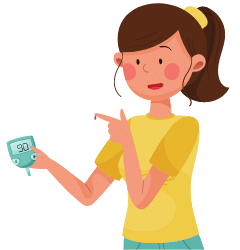
The Archives of Internal Medicine don’t lie. In an 11 year study conducted on 28,812 postmenopausal women, regular coffee drinking was associated with a reduced risk of type II diabetes. The reason why? because it contains antioxidants, phytochemicals, and minerals that can directly decrease the risk of this health condition.
Coffee intake was reviewed, ranging from zero to six cups a day; the women who drank six or more cups of Joe daily had a 22% lower risk of diabetes. Interestingly enough, the association was even larger in decaffeinated versus caffeinated.
Another study conducted over 4 years period and the results were published in 2014, found that people who drink more than one cup of coffee per day had a lower risk of having type II diabetes by 11%.
2. Drinking coffee protects against Alzheimer’s disease
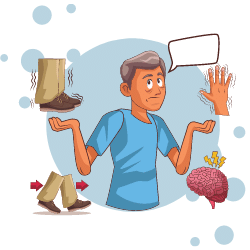
An intriguing study conducted on mice and published in the Journal of Alzheimer’s Disease brought to light that an unidentified coffee component can interact with caffeine in the beverage to provide further protection against Alzheimer’s disease.
University of South Florida researchers now believe that this relationship will increase blood levels of a critical growth factor needed to fend off early-onset Alzheimer’s development.
Another study published in 2002 shows the same results that coffee drinkers have a lower risk by 65% of Alzheimer’s disease.
3. Drinking coffee prevents depression in women
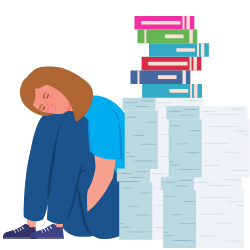
Yes, many of us depend on a cup of Joe to perk up to face the day, but research also points out that women who drink four cups of coffee a day are 20% less likely to suffer from depression than women who rarely drink any.
The study specifically highlighted caffeine consumption, confirming that women in the top fifth of caffeine consumption in the study from several sources, including chocolate and caffeinated soft drinks, had a reduced risk of depression compared to women in the bottom fifth.
4. Drinking coffee can lower the risk of skin cancer
One study confirms that regular coffee consumption is an important protective factor to prevent basal cell carcinoma, the most common form of skin cancer in the US. Once again, the amount of caffeine consumption in the study was inversely associated with risk meaning, drinking more coffee provides even greater protection against skin cancer!
5. Drinking coffee can reduce the risk of endometrial cancer
A 2011 Harvard study revealed that women who regularly drank several cups of coffee each day over the long term were less likely to develop cancer in the uterus’ lining compared to women who drank little coffee.
Harvard University researchers analyzed 67,470 women from ages 34 to 59 for 26 years. Women who drank four or more cups of Joe a day had a 25% lower risk of developing endometrial cancer compared to women who drank from two to three cups a day with a 7% lower risk.
These benefits were most seen in overweight and obese women who had a decreased risk of developing this cancer per additional cup of coffee consumed by 12% and 20%, respectively. One more victory for coffee!
6. Drinking coffee can slow the progression of liver disease
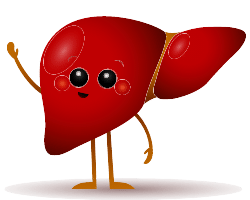
Drinking a minimum of three cups of coffee a day can help slow down liver disease progression in patients diagnosed with chronic hepatitis C. Compared to patients who didn’t drink coffee. Research has proven that drinking coffee reduces the risk of cirrhosis, which is caused by many diseases that may affect the liver.
Coffee drinkers have been found less likely to have cirrhosis of the liver due to excess alcohol intake, as well as a reduced risk of liver cancer.
If you want to get a jump start on your health benefits, then all you have to do is invest in a daily cup of Joe because numerous studies have shown, including a study by Kaiser Permanente, that regular coffee drinkers dramatically reduce cirrhosis of the liver.
Coffee is also known to lower harmful enzymes in the liver that lead to damage and cirrhosis, so you can sip away and feel safer than ever.
7. Drinking coffee can reduce the risk of stroke in women
Drinking coffee regularly can protect against stroke in women, according to a study published in Stroke: Journal of the American Heart Association. Women analyzed in the study who drank more than one cup a day had a reduced risk of stroke by 22% to 25% compared to women who drank less.
The Swedish study followed 34,640 women from the ages of 49 to 83 for a decade; study results didn’t differentiate between regular or decaffeinated coffee consumption, although coffee drinkers in Sweden are less likely to drink decaf.
8. Drinking coffee can protect against heart failure
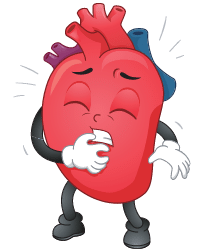
In the past, there was a debate because of a study done on coffee drinkers that showed that coffee consumption was potentially linked to heart failure, but it was concluded that there is no direct relationship between coffee and heart disease.
On the contrary, drinking a moderate amount equivalent to two 8 ounce cups a day could provide some protection against heart failure, according to recommendations from the American Heart Association.
Although the AHA once discouraged coffee drinking, the tables have turned since regular coffee drinkers have been proven to have an 11% lower risk of heart failure.
In a study published by AHA in 2018, they concluded that: Increased coffee intake is associated with reduced HF and stroke outcomes in FHS, CHS, and ARIC. source
Another study done on 37,000 men in Sweden showed no connection between coffee drinking and heart failure. Within the study, only 784 men developed heart failure over a nine-year period, and it had nothing to do with their coffee intake.
This study was not done on women so that the results could differ, but it does not seem likely. It has been proven that there is no association between coffee and heart failure, and coffee may have a neutral or even protective effect on the health of the heart.
The initial studies that were done that showed a negative report on coffee consumption were only done retrospectively, which means that heart attack sufferers were questioned about their coffee consumption. Because of this reason, they were inaccurate, and coffee has been proven not to cause heart failure!
9. Drinking coffee can lower the risk of prostate cancer
Isn’t it fantastic news for men everywhere that drinking coffee can reduce the risk of prostate cancer? Can we all breathe a collective sigh of relief?
Men who are regular coffee drinkers have a lower risk of developing lethal prostate cancer, based on a recent Harvard School of Public Health study. The same benefits were provided for both regular and decaffeinated coffee drinkers.
Research has confirmed that men who drink coffee on a regular basis, leaded and unleaded, are much less likely to develop a deadly form of prostate cancer, according to a May 2011 study published in the Journal of the National Cancer Institute1.
Harvard researchers analyzed prostate cancer cases in a group of almost 48,000 men in the US who reported their coffee drinking habits every four years from 1986 to 2008. Overall, the men who drank the most coffee at six or more cups a day were 20% less likely to have any type of prostate cancer. They also had an impressive 60% reduced risk of developing fatal prostate cancer, often spreading to the bones.
How Much Coffee Do Men Need to Drink to Reduce Their Risk of Prostate Cancer?
Men who drank 1 to 3 cups of coffee a day had a 30% reduced risk of prostate cancer overall.
Before you get too excited, researchers confirm that the study findings must still be validated. But even so, coffee could become one crucial factor that may lower the risk of developing the most deadly form of prostate cancer in men worldwide. Ready for another cup?
10 .Drinking coffee can improve Parkinson’s disease
In a 2012 study that assessed patients with Parkinson’s disease, researchers discovered that participants who took caffeine pills saw a noticeable improvement in symptoms of the condition like body stiffness and movement. Although further research is needed, patients who consumed caffeine saw an average decrease of five points on the disease rating scale, impressive for a typical Parkinson’s patient who may score 30 to 40.
And what else can coffee do for you? Well, think about the fact that coffee is full of antioxidants that protect you from free radical damage, meaning that your body is healthier, stronger, and younger for a longer time. I think that green tea needs to watch out for because coffee is at the forefront as the most nutritious beverage that you can get your hands on!
Coffee Antioxidants

You may have heard by now that coffee is full of antioxidants, which provide the benefit of neutralizing free radical damage in the body. Simply put, this has the potential to stop disease and illness and also prevent wrinkles and premature aging.
What Are Antioxidants?
To begin with, it is essential to understand that antioxidants are highly beneficial to your health. Why is that you may ask? Antioxidants neutralize outside free radical damage, often from smoking, pollution, or sun exposure. These same antioxidants will prevent free radicals from damaging the body’s cells, which will stop premature aging and disease.
Many coffee drinkers wonder if freshly brewed grounds contain enough antioxidants to make a difference, and the answer is that it does! It seems that green beans have a higher antioxidant content than roasted beans, but brewed coffee still contains a high level of antioxidants.
It is recommended to drink a moderate amount of coffee to procure the most benefits from these antioxidants, which boils down to 2 or 3 cups per day. One more reason to enjoy a delicious and healthy cup of Joe!
How Do the Antioxidants in Coffee Measure Up?
To break it down for you, the average American drinks 1.64 cups of coffee per day. This simple coffee consumption offers 1299 mg of antioxidants daily, which is compared to the same amount provided by tea at only 294 mg. It is recommended to eat a diet rich in antioxidants, including whole grains, fruits, and vegetables. Still, bananas only provide 76 mg of antioxidants, dried beans at 72 mg, and corn at 48 mg.
That is a significant difference when you compare it to the generous health payoff offered by your daily cup of Joe!
What is the Healthiest Way To Enjoy Your Coffee?

Coffee can be enjoyed in a countless number of ways, but here are some helpful tips to make sure that you are drinking to your health with every cup of Joe:
- Use a ceramic kettle to boil water for your French Press instead of a metal kettle. This will prevent a metal taste in the water so that your brew tastes better.
- When using a coffee maker, always use filtered water to brew without minerals and protect your machine’s life.
- Use raw sugar to sweeten your coffee instead of sugar substitutes.
- Use organic cream to add to your coffee instead of processed coffee creamers.
- Purchase organic coffee that is grown without pesticides.
- To protect yourself and the environment, purchase Fair Trade coffee that promotes a better coffee product to guarantee a fair wage to the farmer.
Coffee That Is Easy on the Stomach?
Many coffee lovers come to a crossroads in their life if they begin having stomach and digestion issues related to their Java.
Luckily, the latest research has shown that drinking a dark roast of coffee can alleviate many of these stomach issues.
If you have a highly sensitive stomach, this will be the hope that you have been looking for to reduce the effects of coffee sensitivity. As it turns out, lighter roasts of beans provide much more acid, which can upset a delicate stomach. When beans are darkly roasted, it contains compounds that stop the production of acid within the stomach, which dramatically reduces stomach irritation overall. Dark roasted coffees have almost twice this compound than lightly roasted beans, which can offer overall comfort by drinking a darker roast instead of a lighter roast if you suffer from stomach irritation.
This is the opportunity for coffee lovers who have sensitive stomachs to continue integrating their cup of Joe into their morning schedule. The bottom line is that it is recommended to drink 2 to 3 cups of Joe on a daily basis, which provides a long list of health and disease prevention benefits. We also understand that the component NMP found within coffee can reduce the development of acid within the stomach, significantly alleviating any discomfort from stomach sensitivity.
Coffee and Brain Power

The Truth About Coffee and Your Brain Power
Sure, you probably have a caffeine addiction like 50% of the rest of us in the US do, right? But have you ever thought about how coffee benefits your mental performance on a day-to-day basis?
Australian researchers published a recent study in the Journal of Personality and Individual Differences. They proved that coffee could boost your performance in repetitive or menial tasks, but it doesn’t provide any specific benefit to improving your thought process.
Drinking coffee in the morning can fire up neurons in your brain, but the caffeine in coffee will only increase your work output and not your overall thinking process. Caffeine can speed up your thinking and improve memory, yet it does not boost creative energy.
So if you need a little more gas in your tank before a big meeting, definitely consider a delicious cup of Joe. Just don’t rely on coffee alone to make you brilliant enough at work to earn that promotion. When you drink coffee in moderation coupled with a healthy, balanced diet, then you’ll get all the antioxidants, as well as vitamins and minerals that you need to keep your brain going strong.
Health experts recommend drinking 2 to 3 cups of coffee per day for maximum health benefits. That’s some interesting food for thought.
Smell Coffee For Healthy Benefits
Did you know that if you take a sniff of your Java, it will provide healthy antioxidant benefits? Studies have proven that drinking coffee offers antioxidant benefits to your body that can protect you from early age and disease, but sniffing your Java can also provide antioxidant properties to combat the damaging effects of stress in your body’s cells and boost your brainpower. source
Medicinal scents have been used over time in ancient cultures, such as the Chinese, Hebrew, and Roman. Sniffing a particular scent has the ability to directly affect the emotions and behavior in your body, as well as your short-term memory. A study on rats recently showed that the rats’ protein levels increased when they smelled roasted coffee, which provided them with antioxidant benefits to protect their cells from stress.
To conclude, not only can you drink your coffee for health benefits, but you can also sniff its delightful aromas to shield your body from free radical damage through healthful antioxidant protection!
Coffee and Weight Loss
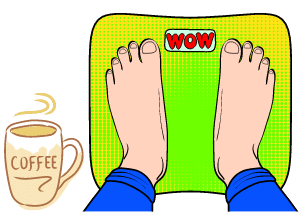
When you consider the fact that the diet industry rakes in $55 billion a year worldwide, the odds are that you’ve probably tried a diet product, or two, or three.
Guilty!
But have you considered the fact that something as safe – not to mention affordable – as your morning cup of Joe could help you to beat the bulge and stay at a healthy weight?
No, I’m not talking about forgoing food altogether and living off a diet of only coffee. I’m talking about drinking coffee after each meal, which could help your body process food more slowly. This theory comes straight from medical researcher and founder of Medicine Hunter Chris Kilham.
Kilham believes that regularly drinking coffee can aid in weight loss and even reduce the risk of adult-onset diabetes, which is backed up by several studies published in medical journals. One specific study published in the French review Phytothérapie proved that green coffee bean extract could reduce fat.
Even just sipping an espresso shot after a meal can help suppress glucose production and cause the body to release more gastric juice to stimulate digestion. Drinking caffeinated coffee will also increase metabolism and decrease how quickly the stomach releases its contents into the small intestine.
Bottom line? Drinking coffee regularly could aid in digestion and help to support weight maintenance. Food for thought
Weight Loss Traps To Avoid
If you are on a great weight loss regimen with the plan to lose pounds and inches to look stunning in your bikini, then you better be sipping on a cup of Joe! Coffee has been proven to improve metabolism and suppress appetite, but you need to know what traps to avoid so that you will not pack on even more pounds by accident.
- Don’t drink fancy coffee house drinks that are loaded with fat, sugar, and extra calories. We are talking about frappuccinos here, people!
- It is best to drink your coffee black, without cream or sugar. This will keep you from having any added calories, and it will also give you the best in natural coffee taste and flavor!
- Don’t eat unhealthy snacks with your coffee, like muffins and cookies. That’s a definite no-no!
- Don’t drink half a pot of coffee at once! To keep your metabolism high, it is best to drink several cups of coffee throughout the day.
Now you are on the way to fantastic weight loss benefits, all from one little cup of Joe.
Coffee and Depression
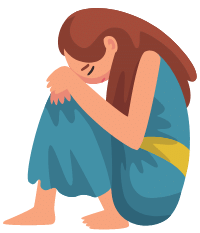
Could Coffee Help You Beat Depression?
Recently, coffee has been praised as a miracle beverage, thanks to its long list of health benefits. Drinking four cups of Joe per day can reduce the risk of stroke, skin cancer, diabetes, and even depression?
The Harvard School of Public Health has researched how drinking four or more cups of coffee each day can affect depression in women, although men were not a part of the study. The study was done on 51,000 women from the Nurses’ Health Study in 1996. At the time of the study, the women didn’t show any signs of clinical depression. The data from the study was based on the women’s responses to questionnaires from 1980 to 2004 and an analysis of their caffeine consumption habits.
There were no cases of depression in women in 1996. By 2006, 2600, cases of depression were diagnosed. Other factors like smoking, medical conditions, activity levels, and marital status were adjusted. Researchers were able to indicate that drinking caffeinated coffee had an impact on depression in women.
The women who drank four or more cups of coffee each day had a 20% reduced risk of depression.
Keep in mind that the same benefits could not be had from other caffeinated sources, like chocolate or tea.
Coffee and Teeth

Does Drinking Coffee Lead To Healthy Teeth?
Studies show that coffee can help prevent dental caries if consumed without additives.
This is an exciting development from the study camp, but also, it has been found that coffee has antibacterial and anti-adhesive benefits. This is precisely what you need to keep your teeth protected and healthy, as well as to prevent cavities!
These work to protect your teeth’ surface so that bacteria do not adhere to them, which also safeguards you from tooth decay. Since coffee is also antibacterial, it will keep any extra bacteria from forming and further harming your teeth. Yes, coffee may have gotten a bad rap because of the so-called “coffee breath,” but it turns out that bacteria is the culprit behind that as well.
Can Coffee Reduce Cavities?
More and more studies have proven that coffee is no longer the bad guy. The benefits of drinking it regularly far outweigh any negative effects that it may have.
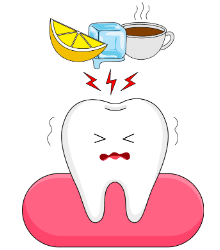
Coffee can reduce the risk of colon cancer, gallstones, Parkinson’s disease, and even cavities. A compound called Trigonelline will prevent plaque from adhering to the enamel on your teeth. This compound in coffee can help to reduce dental cavities.
Trigonelline is an antioxidant that gives coffee its delicious smell and slightly bitter flavor. Antioxidants are necessary for the body to neutralize free radical damage, which can cause premature aging and even cancer.
The antioxidant Trigonelline is antibacterial, which will prevent bacteria from adhering to tooth enamel. This antibacterial compound will also naturally help your body to fight infection and resist plaque to prevent cavities. Of course, coffee is also full of staining agents called chromogens. It’s best to rinse your mouth with water and chew sugar-free gum after drinking your cup, which will help absorb any staining agents to prevent them from sinking deeper into your teeth.
Chromogens in coffee don’t have a negative effect on your health, but they can dull your smile. Still, coffee is a great choice to prevent cavities in the long run – as long as you protect your teeth from staining by practicing good oral hygiene.
Coffee and Workout
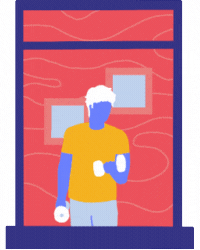
Coffee To Boost Pre-Workout Testosterone
If you are a male looking to enhance your workout, then you may want to consider downing a cup of coffee prior to it because it will boost your testosterone by 61%. What this means for you is that you will be able to build more muscle, build stronger bones, and reduce body fat, all because of the fact that coffee is going to spike your levels of testosterone so that you can workout harder.
Coffee is also perfect to drink prior to a workout, regardless of your sex, because it will block chemicals that cause soreness and inflammation in your muscles for higher performance. One of the other significant factors of drinking the caffeine in coffee is that it releases dopamine, which is a feel-good chemical, into your brain so that you feel happy and rewarded. It will also cause adrenaline to be rushed into your body through the adrenal glands so that you will be totally pumped to workout.
If you factor in all of these incredible benefits, then you better start brewing up a shot of espresso prior to your workout every time! Perfect.
Updated for 2023.
FAQ
Can Coffee Really Stunt Your Growth?
If you ever tried to sneak coffee in your teenage years, you may have been reminded of the old wives tale that it stunts your growth. But is there any truth to this myth? What is fact versus fiction?
It seems that this myth came into play in the early 1700s in Germany. Germans at that time believed that coffee made women sterile. As the years went on, the public began to view coffee in a different light, thinking that it had the power to stunt children’s growth. Read more about coffee history myths.
Many experts believe that this myth was due to a study that linked caffeine consumption with a reduced bone density that caused osteoporosis. Unfortunately, this study was only done on elderly people that were eating a diet that was already lacking severely in calcium, leading to a loss of bone mass.
Studies that followed did confirm that women from ages 65 to 77 that drank roughly 18 ounces of caffeine each day did experience a greater bone loss over three years than those who didn’t drink caffeine whatsoever. But these consequences were only seen in women with variations in their vitamin D cell receptors. The bone loss was completely neutralized if the women had the daily recommended value of 1,200 mg of caffeine a day in their diets.
Last but not least, a recent study tracked a group of 81 teenagers over six years.
The study results showed no difference in the bone density of the biggest coffee drinkers compared to those who didn’t even have a sip of a cup of Joe. Moral of the story? Drink in moderation, and there’s no need to worry about your height.
Does Coffee Prevent Absorption of Vitamins?
Coffee is one of the primary sources of caffeine for many Americans, and each cup of Joe provides roughly 100 mg of caffeine. This caffeine content may interfere with certain mineral absorption, like calcium, iron, and magnesium, although the loss is negligible.
A few studies suggest that drinking coffee could cause calcium loss from the bones, but this danger can quickly be negated by drinking your coffee with nonfat milk.
If anything, research has shown that coffee offers nutrients to your daily diet, and it is the top source of antioxidants for Americans. This is not because it has more antioxidants than dark chocolate, tea, and red wine, but because Americans consume so much coffee daily.
Many people feel that they should cut back on their coffee drinking, but research says quite the opposite. Research recommends drinking 2-3 cups of Joe a day to provide health benefits, and you can reduce any potential mineral loss by eating a balanced diet of fruits and vegetables, as well as taking a supplement.
Can Diabetics Drink Coffee?
If you are diabetic and want to enjoy your cup of Joe still, then drinking coffee should be safe as you can drink it in moderation and you take care of your blood sugar, and drink less-sugar coffee.
Experts recommend reducing the amount of caffeine per day to 200 milligrams for people with diabetes.
Regular coffee drinkers also have been proven to have a third less risk of developing diabetes later on in life. Coffee is full of antioxidants, which will protect the body from free radical damage. It contains more antioxidants than chocolate, tea, or red wine, and it is also an excellent source because we drink so darn much of it!
If you have diabetes, you can drink coffee on a daily basis to offer you the potential to control your blood sugar.
Coffee also has been proven to provide several benefits in preventing other diseases for longer life.
How Much Caffeine During Pregnancy?
Pregnant women quickly discover that there are a number of myths surrounding pregnancy. One of the most popular myths is that you have to give up coffee and all caffeinated products whatsoever. But this isn’t necessarily true.
The NHS recommends that pregnant women reduce their caffeine intake to less than 200 mg per day, which is roughly one 12 ounce cup of coffee. This is due to a study published by the American Journal of Obstetricians and Gynecology showing that pregnant women who drank more than 200 mg or more of caffeine per day had twice the risk of miscarriage compared to women who didn’t drink caffeine.
But not all studies have shown the same correlation between drinking coffee and miscarriage.
The above study was done in 2008, and since that time, the American College of Obstetricians and Gynecologists has released a new statement that caffeine in moderation at less than 200 mg per day won’t increase the risk of miscarriage or preterm labor.
Does Coffee Raise Cholesterol?
If you are someone concerned with your health, it is essential to monitor your body’s cholesterol levels. High cholesterol has the potential to slow the blood flow to and from the heart, which could potentially cause difficulty breathing or a heart attack.
Many people stayed away from coffee drinking in the past because it was rumored to raise cholesterol levels. There also were some studies that did claim that drinking unfiltered coffee would also elevate cholesterol. Other studies showed that individuals who drank decaf had higher LDL levels of cholesterol.
The bottom line is that the studies were inconclusive, and not just one factor contributes to high cholesterol. It is important to drink in moderation at 2 to 3 cups per day and have a healthy exercise and diet plan for success.
Can Coffee Sober You Up?
There was a group of mice studied at Dartmouth College that were given a combination of alcohol and caffeine and required to do a maze. The comparison group of mice was only administered saline for the test.
The drunk mice who had caffeine showed more movement with less anxiety, but their learning skills were greatly affected. This generally meant that the alcohol in the mice negated the caffeine’s ability to cause anxiety, but it did not stop the negative effects of alcohol on their learning process.
The bottom line is that coffee will wake you up if you are drunk, but it will not decrease your drunkenness. It can actually be a dangerous combination because it will cause you to feel fewer effects of the alcohol so that you potentially feel more competent and less drunk when you really are not.






